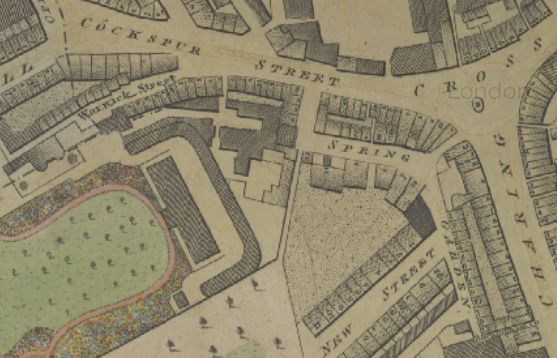

Search london history from Roman times to modern day
St Martins pub history index

Spring Gardens, Cockspur street and Charing Cross in 1799
British Coffee House
A listing of historical public houses, Taverns, Inns, Beer Houses and Hotels in St Martins in Fields, London.
Residents at this address.
Opposite Spring Gardens is the Union Club, at the south-west corner of Trafalgar Square, occupying the site of the famous "Cannon " Coffee-house and Tavern. The architect was Sir Robert Smirke, whose greatest structure is the British Museum, but who was also responsible for the Mint, the General Post Office in St. Martin's-le-Grand, the College of Physicians, Covent Garden Theatre (burnt down in 1856), the extension of King's Bench Walk, and King's College (London). In 1850 the club was chiefly composed of merchants, lawyers, members of Parliament, and, as James Smith, who was a member, writes, " of gentlemen at large." The house is built on ground let by the Crown for 99 years from Oct. 16, 1822.
As the " Cannon " Coffee-house and Tavern it was a popular place of assembly for anniversary and other festivals. "The Independent Electors of the City and Liberty of Westminster, who have agreed to meet Monthly to commemorate the noble Struggle they have so successfully made, are desir'd to meet their Friends at the Cannon Tavern. Charing Cross, Tomorrow, being the 5th instant, at six o'clock." ' Here, among other similar resorts tickets might in 1742 have been had for the "Annual Feast of the Ancient and Honourable Society of Free and Accepted Masons at the Haberdashers Hall," whither the Brethren were to proceed after breakfast at the Right Hon. the Lord Ward's, Grand Master elect, at his House in Upper Brook Street, Grosvenor Square, but "No Hackney Coaches were allowed in the procession to the Hall."' The "Cannon" is described in the "Epicure's Almanack," 1815, as having for its landlord Mr. Hodges, whose " larder and soups, his waiters and cooks, are, like our hearts of oak, always ready, the Cannon being charged with ammunition for the stomach. The fumes from the cooking stoves are as delightful to the nose of a military affami as those of gunpowder itself, the incense offered to the god of war."
Curran and Sir Jonah Barrington were in the habit of frequenting the Cannon Coffee-house, Charing Cross, where they had a box every day at the end of the room.
The " Cannon," or " Gun " as it is occasionally known, was the cognisance of King Edward VI., of Queen Mary, and of Queen Elizabeth, and it is doubtless to this circumstance that is owing the fact noted in the " Craftsman " newspaper of the eighteenth century, that "nothing is more common in England than the sign of a cannon." The former sign has now entirely disappeared in London, with the exception of the " Cannon " in Cannon Street, which has a different origin, but the '*Gun" survives in numerous instances.
1809/Charles Bullocke, Cannon Coffee house, Cockspur street, Charing cross/../../Holdens Directory
1822/Cannon Coffee house, Cockspur street/../../History of Yorkshire Directory
** Provided By Stephen Harris
Trying to avoid privacy and cookie settings overwriting content